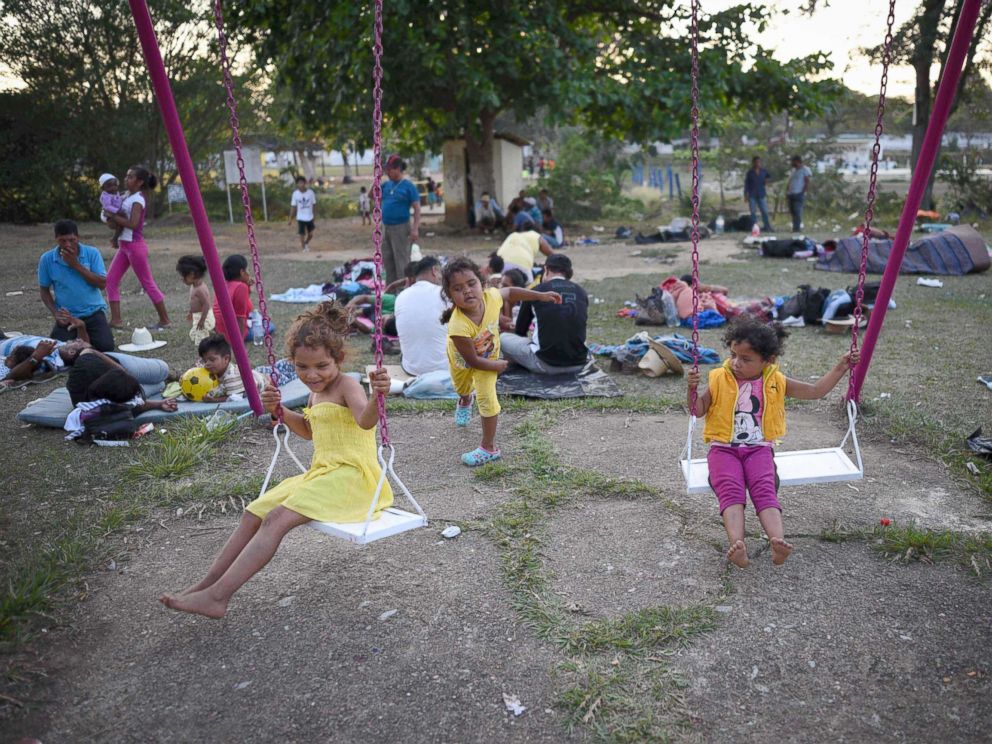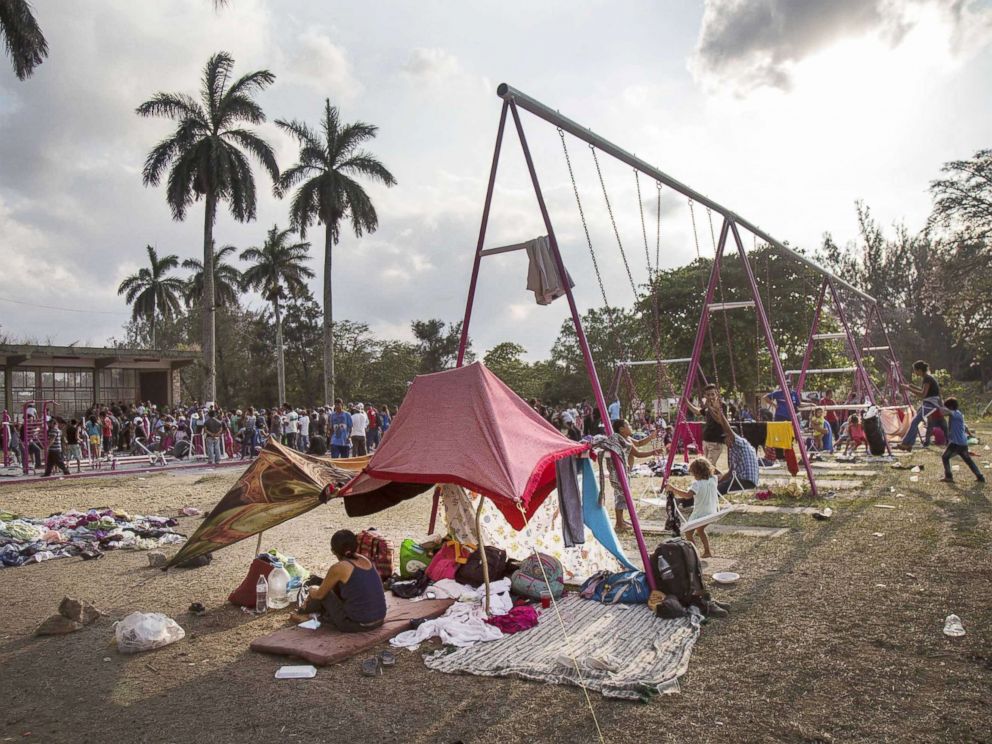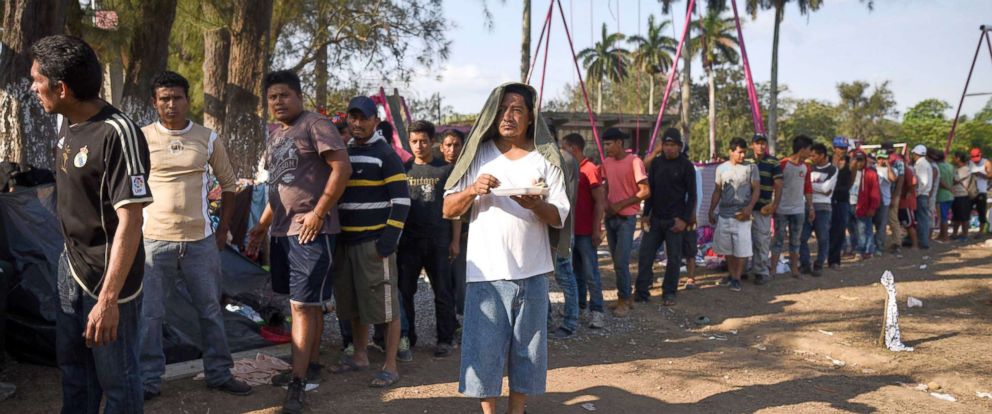Victoria Razo/AFP/Getty Images
Watch'Caravan' of Central American migrants trekking through Mexico
The group responsible for organizing a month-long journey of hundreds of Central Americans away from violence in their homelands and toward the U.S. reiterated on Thursday that the men, women, teens and children it represents have the legal right to demand asylum.
Alex Mensing, a project coordinator for the group, Pueblo Sin Fronteras, confirmed to ABC News there were about 150 people in Tijuana, near the U.S.-Mexico border, with about 175 more on their way there from Mexicali. The vast majority are fleeing dire situations in Honduras, and more than half of those in the so-called caravan are women and children.

Victoria Razo/AFP/Getty Images
Central American children taking part in a caravan called "Migrant Viacrucis" play at a sports center field in Matias Romero, Oaxaca state, Mexico, April 2, 2018
"We will continue to seek safety and dignity for ourselves and our families," Pueblo Sin Fronteras said in a statement issued Thursday. "We ask the U.S. government for adequate reception as refugees and to understand that we embarked on this journey because we had to flee our countries. Returning means putting our lives at risk; we have no other choice but to seek refuge where it exists."
"We will continue to seek safety and dignity for ourselves and our families," Pueblo Sin Fronteras said in a statement issued Thursday. "We ask the U.S. government for adequate reception as refugees and to understand that we embarked on this journey because we had to flee our countries. Returning means putting our lives at risk; we have no other choice but to seek refuge where it exists."
Today and Saturday, many of the refugees will be participating in legal workshops to better grasp what they need to do to claim asylum in the U.S., Mensing said. Most of the approximately 325 individuals on Sunday are expected to venture to the San Ysidro Port of Entry in Tijuana and formally request admission as refugees.
President Donald Trump criticized the migrants earlier this month, tweeting, in part: "Caravans are heading here. Must pass tough laws and build the WALL. Democrats allow open borders, drugs and crime!"
Migrant caravan through Mexico draws Trump's ire
WH press secretary fields questions about what Trump meant with 'breeding' tweet
Trump makes first visit to California as president amid immigration controversy
Immigration and border wall caught up in government funding showdown
Kirstjen Nielsen, U.S. secretary of Homeland Security, said in a statement on Wednesday that "DHS is currently monitoring the travel of the so-called ‘caravan’ towards our Southern border and is doing everything within our authorities to secure our borders and enforce the law."
Anyone entering the country illegally "will be referred for prosecution," she added. "If you make a false immigration claim, you have broken the law and will be referred for prosecution. If you assist or coach an individual in making a false immigration claim, you have broken the law and will be referred for prosecution."
Attorney General Jeff Sessions said in a statement Monday that the U.S. has "the most generous immigration system in the world, but this is a deliberate attempt to undermine our laws and overwhelm our system. There is no right to demand entry without justification. Smugglers and traffickers and those who lie or commit fraud will be prosecuted to the fullest extent of the law."
Both Nielsen and Sessions suggested the asylum seekers should make that request in the first safe country to which they flee, in this case, Mexico.

Luis Villalobos/EPA via Shutterstock
Central American migrants rest in the town of Nicolas Romero, in the state of Oaxaca, Mexico, April 3, 2018.
Citing Title 8 of U.S. Code Section 1225, Pueblo Sin Fronteras said in its statement that "non-citizens with credible fear of persecution in their country of origin have the right to seek asylum in the United States for protection from persecution and violence."
Those who wish to continue on to the U.S. from Mexico should have that right, the group insists.
"We have marched through the streets of Mexico demanding the right to free and safe passage," the statement said. "Although some of us have achieved safety in Mexico through our collective efforts to demand protection, many more cannot be safe in this country because of the institutionalized violence and insecurity that prevail in many parts of the Mexican territory, or because we are persecuted by the same groups as in our countries of origin. The transnational capacity of gangs and criminal groups can not be ignored."
Citing Title 8 of U.S. Code Section 1225, Pueblo Sin Fronteras said in its statement that "non-citizens with credible fear of persecution in their country of origin have the right to seek asylum in the United States for protection from persecution and violence."
Those who wish to continue on to the U.S. from Mexico should have that right, the group insists.
"We have marched through the streets of Mexico demanding the right to free and safe passage," the statement said. "Although some of us have achieved safety in Mexico through our collective efforts to demand protection, many more cannot be safe in this country because of the institutionalized violence and insecurity that prevail in many parts of the Mexican territory, or because we are persecuted by the same groups as in our countries of origin. The transnational capacity of gangs and criminal groups can not be ignored."

No comments:
Post a Comment